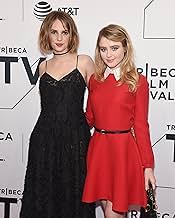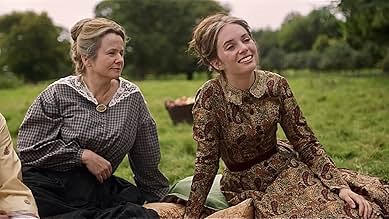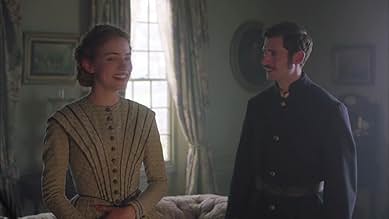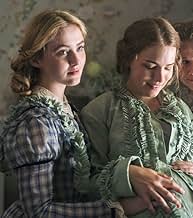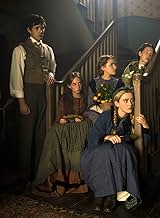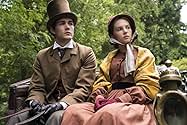Dramatización de la novela de Louisa May Alcott sobre las vidas de las cuatro hermanas March durante la Guerra Civil Americana mientras aprenden a navegar por el amor, la pérdida y las prueb... Leer todoDramatización de la novela de Louisa May Alcott sobre las vidas de las cuatro hermanas March durante la Guerra Civil Americana mientras aprenden a navegar por el amor, la pérdida y las pruebas del crecimiento.Dramatización de la novela de Louisa May Alcott sobre las vidas de las cuatro hermanas March durante la Guerra Civil Americana mientras aprenden a navegar por el amor, la pérdida y las pruebas del crecimiento.
- Premios
- 3 premios ganados y 7 nominaciones en total
Explorar episodios
Opiniones destacadas
'Little Women' is one of my all-time favourite books. Love the well-rounded and easy to care for characters and their interactions, strengths and faults and the story resonates with me every time and makes me feel many emotions.
It has been adapted quite a few times, and while none of the adaptations are quite perfect they do a noble and very respectable job adapting a harder to adapt book than one would think. They also fare very strongly on their own merits. This three part adaptation is the latest one and to me it's one of the lesser ones. By all means, it's far from bad and the generally mixed to positive critical reaction is understandable, just as much as it is understandable than the fan reaction is divisive. Actually, from personal opinion there are many admirable qualities, mainly the cast, but the adaptation doesn't completely satisfy.
As an adaptation, it's a bit of a mixed bag. There are omissions and also a fair bit of re-ordering. There were times, in the first two episodes, where initially there was dismay at how crucial scenes were left out and then appear later with nowhere near as much impact and skimmed over (like Beth and Mr Laurence). Characterisation varies. The four sisters, with only reservations with Amy, are handled very well, while the adaptation is even better with giving more complexity to Marmee and having the best developed Aunt March of all the 'Little Women' adaptations personally seen. 'Little Women' (2017) also really underwrites old Mr Laurence, whose change is far too quick, and Professor Bhaer (a problematic character in the first place) is a cipher practically, his apology for insulting Jo's literature rang hollow to me.
What would have perhaps solved all this would have been making it four parts, but just focusing on 'Little Women' and adapting 'Good Wives' (condensed into a 1 hour episode and feels especially rushed) another time like the following year. That way there would be more time to delve into everything properly and the episodes wouldn't have felt as rushed and jumpy.
Having said that, there is always an effort by me to judge book to film/television on its own merits. On this front, 'Little Women' (2017) is uneven, with so much to like but falls short in other areas. Pacing is too hasty, while more could have been done with the burdens of the sisters and how they're overcome throughout all three episodes and not just the first (Jo comes off the most successfully, but Amy didn't seem to change enough and there are parts, like her revenge on Jo, where what should have been childish behaviour was far too mean). Emotional impact is also uneven, Father's and Beth's illnesses are handled very well, as are the heart-breaking tragedy in the final episode (even when you know it's coming), Meg's outburst and the burnt book. Why Mr Laurence was the way he was earlier in the story, he and Beth, the Moffets, everything regarding the downsides to being rich and with Professor Bhaer weren't delved into properly.
For my tastes too, the score was too twee and felt at odds with everything else, and, while she got the personality spot on, Kathryn Newton is too old for Amy and Amy's burdens are not given enough growth. Professor Bhaer is completely bland.
On the other hand, there is a lot to admire. 'Little Women' (2017) looks great. The scenery and costumes are beautiful and evocative and everything is elegantly shot. The script is cosy, thought-provoking, intelligent, has coherence and it flows well. The storytelling, despite its faults, avoids being mawkish, captures the feelings of sisterhood perfectly and the interaction is spot on (Jo and Laurie for instance). It's nicely directed too.
The cast are the main reason to see it. All four girls are wholly credible and flesh out their characters' personalities just as much. Maya Thurman-Hawke's (helped by that Jo has been the most interesting and developed of the girls) multi-faceted turn is a particular revelation. Willa Fitzgerald charms as Meg and Annes Elwy's Beth is very heartfelt. Jonah Hauer-King makes one understand what the girls see in him.
Making even more of an impression are the adults. Emily Watson brings dignity, nuance and poignant sincerity to Marmee, making her more than just a saint, while Angela Lansbury has a whale of a time as Aunt March. Dylan Baker is a firm and sympathetic father figure, and despite being underused and with not enough material Michael Gambon is suitably curmudgeonly.
Overall, could have been better but admirable. 7/10 Bethany Cox
It has been adapted quite a few times, and while none of the adaptations are quite perfect they do a noble and very respectable job adapting a harder to adapt book than one would think. They also fare very strongly on their own merits. This three part adaptation is the latest one and to me it's one of the lesser ones. By all means, it's far from bad and the generally mixed to positive critical reaction is understandable, just as much as it is understandable than the fan reaction is divisive. Actually, from personal opinion there are many admirable qualities, mainly the cast, but the adaptation doesn't completely satisfy.
As an adaptation, it's a bit of a mixed bag. There are omissions and also a fair bit of re-ordering. There were times, in the first two episodes, where initially there was dismay at how crucial scenes were left out and then appear later with nowhere near as much impact and skimmed over (like Beth and Mr Laurence). Characterisation varies. The four sisters, with only reservations with Amy, are handled very well, while the adaptation is even better with giving more complexity to Marmee and having the best developed Aunt March of all the 'Little Women' adaptations personally seen. 'Little Women' (2017) also really underwrites old Mr Laurence, whose change is far too quick, and Professor Bhaer (a problematic character in the first place) is a cipher practically, his apology for insulting Jo's literature rang hollow to me.
What would have perhaps solved all this would have been making it four parts, but just focusing on 'Little Women' and adapting 'Good Wives' (condensed into a 1 hour episode and feels especially rushed) another time like the following year. That way there would be more time to delve into everything properly and the episodes wouldn't have felt as rushed and jumpy.
Having said that, there is always an effort by me to judge book to film/television on its own merits. On this front, 'Little Women' (2017) is uneven, with so much to like but falls short in other areas. Pacing is too hasty, while more could have been done with the burdens of the sisters and how they're overcome throughout all three episodes and not just the first (Jo comes off the most successfully, but Amy didn't seem to change enough and there are parts, like her revenge on Jo, where what should have been childish behaviour was far too mean). Emotional impact is also uneven, Father's and Beth's illnesses are handled very well, as are the heart-breaking tragedy in the final episode (even when you know it's coming), Meg's outburst and the burnt book. Why Mr Laurence was the way he was earlier in the story, he and Beth, the Moffets, everything regarding the downsides to being rich and with Professor Bhaer weren't delved into properly.
For my tastes too, the score was too twee and felt at odds with everything else, and, while she got the personality spot on, Kathryn Newton is too old for Amy and Amy's burdens are not given enough growth. Professor Bhaer is completely bland.
On the other hand, there is a lot to admire. 'Little Women' (2017) looks great. The scenery and costumes are beautiful and evocative and everything is elegantly shot. The script is cosy, thought-provoking, intelligent, has coherence and it flows well. The storytelling, despite its faults, avoids being mawkish, captures the feelings of sisterhood perfectly and the interaction is spot on (Jo and Laurie for instance). It's nicely directed too.
The cast are the main reason to see it. All four girls are wholly credible and flesh out their characters' personalities just as much. Maya Thurman-Hawke's (helped by that Jo has been the most interesting and developed of the girls) multi-faceted turn is a particular revelation. Willa Fitzgerald charms as Meg and Annes Elwy's Beth is very heartfelt. Jonah Hauer-King makes one understand what the girls see in him.
Making even more of an impression are the adults. Emily Watson brings dignity, nuance and poignant sincerity to Marmee, making her more than just a saint, while Angela Lansbury has a whale of a time as Aunt March. Dylan Baker is a firm and sympathetic father figure, and despite being underused and with not enough material Michael Gambon is suitably curmudgeonly.
Overall, could have been better but admirable. 7/10 Bethany Cox
Unlike many classic adaptations the BBC has released in the past, problem after problem weighs down Little Women and stops the series from being a truly enjoyable watch.
The book itself is largely written in a sweet, innocent voice/tone, and it works well within the text. However, when translating or trying to capture that same voice or spirit in actual dialogue for the screen, it comes off as amateurish or overly sentimental when spoken aloud. The text's tone is actually one of the reasons why this book is difficult to adapt. It is not the acting that lets the series down, rather it is the words that are unbelievable. People simply don't/didn't speak in such a way, even in the Victorian period. If this version is trying to modernize the girl's characters/eccentricities and the story's main message, why could it not modernize the language a bit or be a little more age appropriate- of course, still keeping it in line with the book's tone. An adaptation of Little Women should strike a balance between the two parts of the girls' and Laurie's journey into adulthood. First, establishing the way things are and have always been in the March home in a playful tone, and then, as they are forced to change through the circumstances of life and love, the tone becomes more heartwarming and more mature. From the get-go, this version applies a serious and mature tone despite the language used and the children's level of maturity, so, there is never a real transformation in character/perspective for any of the children, only in the circumstances they find themselves in.
Another glaring problem is the editing and structuring of the plot. Simply put, many scenes are too short; the scenes are like snapshots; they tell the basic story from a surface, visual level, but it lacks any depth, detail, or real explanation. This version misses the opportunity, being that it is longer and has more time, to include parts that have been left out of adaptations before it- parts that develop or establish the characters, their relationships, and their motives (examples, Jo visiting Laurie when ill, meeting Mr. Lawrence, Laurie's backstory and mother, the girls engaging in Jo's plays, Laurie joining in). Actually, this version excludes more than it adds, which is a little baffling. How can so much be glossed over?
The last problem is the accompanying score. If I am not mistaken, the music used within the series seems to be lifted from or inspired by the Radio 4 play of Little Women. Which is an odd choice, being that it is not of the period. Adding a modern score can work, but here, it is a miss-match.
Though the 94 film has its faults as well, it remains the best crack at adapting Alcott's work, which is disappointing seeing that the BBC had so much potential.
The book itself is largely written in a sweet, innocent voice/tone, and it works well within the text. However, when translating or trying to capture that same voice or spirit in actual dialogue for the screen, it comes off as amateurish or overly sentimental when spoken aloud. The text's tone is actually one of the reasons why this book is difficult to adapt. It is not the acting that lets the series down, rather it is the words that are unbelievable. People simply don't/didn't speak in such a way, even in the Victorian period. If this version is trying to modernize the girl's characters/eccentricities and the story's main message, why could it not modernize the language a bit or be a little more age appropriate- of course, still keeping it in line with the book's tone. An adaptation of Little Women should strike a balance between the two parts of the girls' and Laurie's journey into adulthood. First, establishing the way things are and have always been in the March home in a playful tone, and then, as they are forced to change through the circumstances of life and love, the tone becomes more heartwarming and more mature. From the get-go, this version applies a serious and mature tone despite the language used and the children's level of maturity, so, there is never a real transformation in character/perspective for any of the children, only in the circumstances they find themselves in.
Another glaring problem is the editing and structuring of the plot. Simply put, many scenes are too short; the scenes are like snapshots; they tell the basic story from a surface, visual level, but it lacks any depth, detail, or real explanation. This version misses the opportunity, being that it is longer and has more time, to include parts that have been left out of adaptations before it- parts that develop or establish the characters, their relationships, and their motives (examples, Jo visiting Laurie when ill, meeting Mr. Lawrence, Laurie's backstory and mother, the girls engaging in Jo's plays, Laurie joining in). Actually, this version excludes more than it adds, which is a little baffling. How can so much be glossed over?
The last problem is the accompanying score. If I am not mistaken, the music used within the series seems to be lifted from or inspired by the Radio 4 play of Little Women. Which is an odd choice, being that it is not of the period. Adding a modern score can work, but here, it is a miss-match.
Though the 94 film has its faults as well, it remains the best crack at adapting Alcott's work, which is disappointing seeing that the BBC had so much potential.
The performances of the young performers are so wooden. It lacks spirit. Disappointing.
I was a bit dubious coming in, but I should have known with BBC and Heidi Thomas attached to it that it would be good. Mostly in my review I will address some of the complaints I have seen regarding the series, and how I believe they were minor, hopefully to encourage you to watch it! I don't believe you'll be disappointed.
Some of the other reviews have complained that it is very fast-paced and takes out many of the unique, quirky aspects of the March sisters and their lives. But omitting the charm and beauty of nature around them? it does not. The sets and shots of nature are beautiful and draw you into their world. Yes, we may feel that we don't get to know the sisters as well as in the book or in some other movie versions, but I believe the miniseries gives us a lovely glimpse into their lives for its length.
I worried about the acting, but everyone did a very fine job. I especially appreciate Jo, a perfect balance of boyishness and independence without being inappropriate to the time period. Amy, as many viewers has complained, was too old for the part in the beginning, and annoyingly had obviously dyed hair, but I was able to overlook these because I was enjoying the show so much, and believe me, I'm usually pretty picky and distracted by such things. Meg and Beth are my favourite people to play their respective roles.
The story does have a bit more of a modern feel, and as some have complained that carries into their speech, but it doesn't stand out too horribly. I didn't care for how some of the little happenings of their lives were switched around seemingly for no reason, especially how soon Marmee is called away to Father.
So, not perfect, but I enjoyed the 3 episodes very much. I cried several times at the very sad and sweet moments between the family, because, after all, I've read and watched the story ever since I was very small, and have 3 sisters of my own, and have gladly welcomed this new series into my heart. Hope you enjoy it too!
Some of the other reviews have complained that it is very fast-paced and takes out many of the unique, quirky aspects of the March sisters and their lives. But omitting the charm and beauty of nature around them? it does not. The sets and shots of nature are beautiful and draw you into their world. Yes, we may feel that we don't get to know the sisters as well as in the book or in some other movie versions, but I believe the miniseries gives us a lovely glimpse into their lives for its length.
I worried about the acting, but everyone did a very fine job. I especially appreciate Jo, a perfect balance of boyishness and independence without being inappropriate to the time period. Amy, as many viewers has complained, was too old for the part in the beginning, and annoyingly had obviously dyed hair, but I was able to overlook these because I was enjoying the show so much, and believe me, I'm usually pretty picky and distracted by such things. Meg and Beth are my favourite people to play their respective roles.
The story does have a bit more of a modern feel, and as some have complained that carries into their speech, but it doesn't stand out too horribly. I didn't care for how some of the little happenings of their lives were switched around seemingly for no reason, especially how soon Marmee is called away to Father.
So, not perfect, but I enjoyed the 3 episodes very much. I cried several times at the very sad and sweet moments between the family, because, after all, I've read and watched the story ever since I was very small, and have 3 sisters of my own, and have gladly welcomed this new series into my heart. Hope you enjoy it too!
I've enjoyed every adaptation of Little Women that I've seen, and this was no exception. As someone who enjoys comparing adaptations across time, I find the story told in this newer style of acting, directing, music etc. a valuable addition to the collection. Some people may not like aspects such as scenes of the Civil War where Father is, and this is the first time we see any of Meg's labour, but for me neither is excessive and both are worth including.
This adaptation isn't perfect, any more than its predecessors are perfect, but let me not list my small gripes here. I found it overall well written, well acted and well cast. The descriptions of the characters were clearly considered when casting (if not 100% adhered to), which is a nice touch and the cherry on top of the actors' generally fine performances. In particular I found Meg engaging, Aunt March very satisfying and Laurie almost straight from the pages of the book, while Father is (I feel) a loyal interpretation yet unlike any I have seen before.
This adaptation isn't perfect, any more than its predecessors are perfect, but let me not list my small gripes here. I found it overall well written, well acted and well cast. The descriptions of the characters were clearly considered when casting (if not 100% adhered to), which is a nice touch and the cherry on top of the actors' generally fine performances. In particular I found Meg engaging, Aunt March very satisfying and Laurie almost straight from the pages of the book, while Father is (I feel) a loyal interpretation yet unlike any I have seen before.
¿Sabías que…?
- TriviaDirector Vanessa Caswill expanded on the idea that historical accuracy and period authenticity was paramount. "We asked them to grow their underarm hair, because that would have been authentic, and not to have visible make-up because they wouldn't have worn any," she says. (Little Women Production Notes)
- ErroresIf Jo is old enough to attend an evening party, she would not be wearing her hair in a long braid, but up in the severe, center-parted styles of the period. Being old enough to put one's hair up and go to parties was an important rite of passage into adulthood, and even someone as unconventional as Jo would not have attended a social function with her hair down.
- ConexionesFeatured in The South Bank Show: Heidi Thomas (2019)
Selecciones populares
Inicia sesión para calificar y agrega a la lista de videos para obtener recomendaciones personalizadas
- How many seasons does Little Women have?Con tecnología de Alexa
Detalles
- Fecha de lanzamiento
- Países de origen
- Idioma
- También se conoce como
- Маленькі жінки
- Locaciones de filmación
- Productoras
- Ver más créditos de la compañía en IMDbPro
Contribuir a esta página
Sugiere una edición o agrega el contenido que falta



